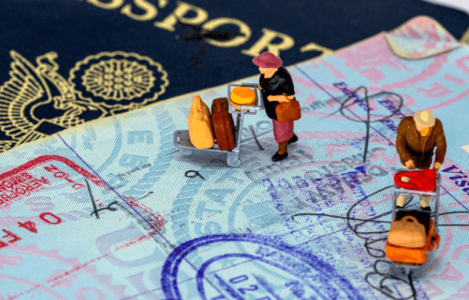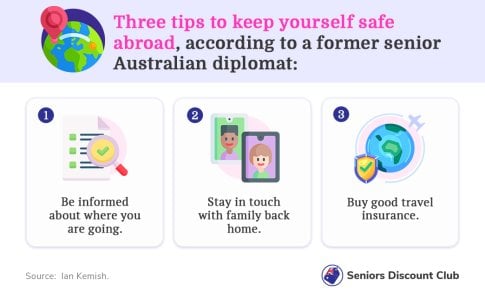Behind the scenes of embassy aid: What you need to know before your next international trip
- Replies 3
Before you embark on your much-awaited overseas trip, there's something else you should look into aside from your flight and hotel bookings — something which can make all the difference in keeping you safe and secure while travelling: the limits of government help should you find yourself in a sticky situation.
This couldn't have been more evident than in a shocking report recently released by the Department of Foreign Affairs and Trade, which revealed an overwhelming number of Australians require consular assistance every year.
As Australians are off to travel the world more and more post-lockdown, it's no wonder more people have sought the help of DFAT throughout 2021 and 2022 – averaging 1.1 million a month in December 2021, after all.
It's heartbreaking to hear, but 1.4 million Australians asked for government help in 2022 alone. To break it down further, four Aussies died overseas every day, two were arrested each day, and more than sixteen thousand Australians turned to their local overseas mission for help in crisis cases.
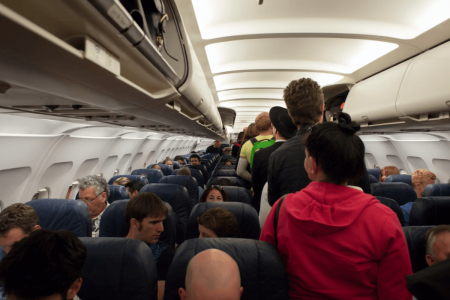
What did they need help with? Well, anything from lost passports or being hospitalised to serious welfare concerns or even arrests.
These figures bring forth a stark realisation: once you leave Australia, it's important to recognise that as much as our government can step in to assist in certain scenarios, there's still a limit to the kind of help they can provide.
One of the pioneers of this report is Ian Kemish, an adjunct professor at the School of Historical and Philosophical Inquiry, The University of Queensland, and a former senior Australian diplomat who served as the head of the Australian consular service from 2000-2004.
According to Kemish, many travellers have confused expectations when it comes to overseas aid, particularly when it comes to arrests. Just because you have an Australian passport doesn't mean you'll get off scot-free in any foreign country.
This also explains why there are between 300 to 400 Aussies languishing in jails in other countries, as the Vienna Convention on Consular Relations puts a cap on how much the Australian consular service can help.
Kemish also called out those who want government help for the wrong reasons, such as 'arranging opera tickets or looking after their pets', which according to him, 'is inappropriate'.
Moreover, he also reminded people that 'most Australians are self-reliant travellers', and that it's still important 'to minimise the risks' while out overseas by taking precautions such as having 'appropriate travel insurance'.
While travelling is exciting, it's important to be prepared for anything that may come your way, especially when it comes to unexpected medical emergencies. Trust us; you don't want to be caught off-guard with hefty medical bills that can put a damper on your adventure!
But don't just take our word for it. Check out this incredible story about an Aussie traveller who was saved from shelling out thousands of dollars after being bitten by a local animal, all thanks to her travel insurance. Talk about a lifesaver!

If you're planning your next adventure, it's important to take some steps to ensure your safety while exploring the world. Luckily, Mr Kemish has some valuable tips to keep you out of harm's way.
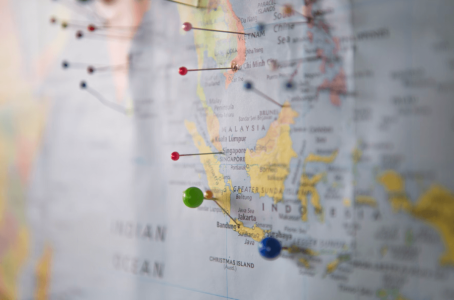
First things first, make sure you're informed about your destination.
We have a responsibility to stay up-to-date on what's happening in the places we plan to visit. Whether it's conflicts, natural disasters, or major weather events, it pays to do your research and be prepared for any unexpected situations.
While the COVID repatriation program may have largely wound up, that doesn't mean you're on your own. Don't forget about your trusty travel insurance policy, which can provide some peace of mind if things take a turn for the worse.
To stay on top of the latest information, make sure to check out the government's Smartraveller website.
They've got everything from emerging health risks to cultural and legal issues in specific countries, so you can be sure you're in the know before you go. And with their fresh advertising campaign, they're really driving home the importance of avoiding trouble in the first place.
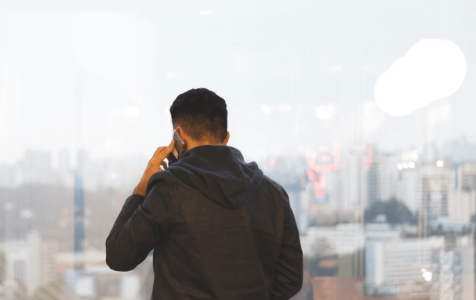
Don't forget to keep your loved ones back home in the loop.
The last thing you want is for them to be worried sick if disaster strikes while you're on your travels. Believe it or not, the consular service deals with hundreds of 'whereabouts' inquiries every year. So, make sure to stay in touch with your family and friends so they know you're safe and sound.
As someone who has been involved in major consular disaster responses, Mr Kemish can tell you that not letting your loved ones know you're okay can cause them unimaginable grief.
In fact, in his recent book, The Consul, there was a story about an Aussie who worked in the World Trade Center during the September 11 attacks but didn't let his family know he was safe for ten whole days because he was actually in London at the time.
So, do yourself and your loved ones a favour and make sure to keep them updated on your whereabouts and well-being. It's a small step that can make a big difference in case of an emergency.
Make sure to get yourself a good travel insurance policy.
Now, you might be thinking insurance is just for covering flight cancellations or lost luggage. But it's actually so much more than that! If you get sick or injured overseas – or even in the worst-case scenario of a death – insurance can be an absolute lifesaver. The Australian government can't just swoop in and pay for a medical evacuation, so you need to be covered.
Mr Kemish has seen firsthand how some Aussies have had to sell their homes just to pay for medical costs abroad. And don't assume that just any old policy will do the trick. You may be surprised to learn that certain activities, like adventure sports, aren't always covered.
Well, there you have it – some invaluable travel tips from a seasoned pro. Remember to stay informed about your destination, keep your loved ones in the loop, and, most importantly, don't forget to invest in a good travel insurance policy. With these tips in mind, you can rest assured that you're prepared for any unexpected situations that may arise during your travels. So go out there and explore the world with confidence, fellow adventurers! Safe travels!
Members, have you ever travelled overseas? If so, what were some of the unexpected situations you encountered? What steps do you take to prepare for a safe and stress-free trip?
Also, have you ever needed to use travel insurance while travelling? Share your stories with us in the comments!
This couldn't have been more evident than in a shocking report recently released by the Department of Foreign Affairs and Trade, which revealed an overwhelming number of Australians require consular assistance every year.
As Australians are off to travel the world more and more post-lockdown, it's no wonder more people have sought the help of DFAT throughout 2021 and 2022 – averaging 1.1 million a month in December 2021, after all.
It's heartbreaking to hear, but 1.4 million Australians asked for government help in 2022 alone. To break it down further, four Aussies died overseas every day, two were arrested each day, and more than sixteen thousand Australians turned to their local overseas mission for help in crisis cases.

International travel is a safe, positive experience for most people, but unfortunately, things do go wrong for some travellers. Credit: Unsplash/Chris Brignola.
What did they need help with? Well, anything from lost passports or being hospitalised to serious welfare concerns or even arrests.
These figures bring forth a stark realisation: once you leave Australia, it's important to recognise that as much as our government can step in to assist in certain scenarios, there's still a limit to the kind of help they can provide.
One of the pioneers of this report is Ian Kemish, an adjunct professor at the School of Historical and Philosophical Inquiry, The University of Queensland, and a former senior Australian diplomat who served as the head of the Australian consular service from 2000-2004.
According to Kemish, many travellers have confused expectations when it comes to overseas aid, particularly when it comes to arrests. Just because you have an Australian passport doesn't mean you'll get off scot-free in any foreign country.
This also explains why there are between 300 to 400 Aussies languishing in jails in other countries, as the Vienna Convention on Consular Relations puts a cap on how much the Australian consular service can help.
Kemish also called out those who want government help for the wrong reasons, such as 'arranging opera tickets or looking after their pets', which according to him, 'is inappropriate'.
Moreover, he also reminded people that 'most Australians are self-reliant travellers', and that it's still important 'to minimise the risks' while out overseas by taking precautions such as having 'appropriate travel insurance'.
While travelling is exciting, it's important to be prepared for anything that may come your way, especially when it comes to unexpected medical emergencies. Trust us; you don't want to be caught off-guard with hefty medical bills that can put a damper on your adventure!
But don't just take our word for it. Check out this incredible story about an Aussie traveller who was saved from shelling out thousands of dollars after being bitten by a local animal, all thanks to her travel insurance. Talk about a lifesaver!
Key Takeaways
- The number of Australians travelling overseas has increased, with almost 1.1 million leaving the country in December last year.
- DFAT's consular service assists Australians in trouble overseas, but personal responsibility is essential for travellers as well.
- Australian passport holders should have realistic expectations of the support their embassy can provide and ensure they take out appropriate travel insurance.
- There are limitations to the support the consular service can provide, particularly in situations like arrest cases overseas.
If you're planning your next adventure, it's important to take some steps to ensure your safety while exploring the world. Luckily, Mr Kemish has some valuable tips to keep you out of harm's way.

Travellers have a responsibility to know what's happening at their planned destinations. Credit: Unsplash/Z.
First things first, make sure you're informed about your destination.
We have a responsibility to stay up-to-date on what's happening in the places we plan to visit. Whether it's conflicts, natural disasters, or major weather events, it pays to do your research and be prepared for any unexpected situations.
While the COVID repatriation program may have largely wound up, that doesn't mean you're on your own. Don't forget about your trusty travel insurance policy, which can provide some peace of mind if things take a turn for the worse.
To stay on top of the latest information, make sure to check out the government's Smartraveller website.
They've got everything from emerging health risks to cultural and legal issues in specific countries, so you can be sure you're in the know before you go. And with their fresh advertising campaign, they're really driving home the importance of avoiding trouble in the first place.

If disaster strikes when you are travelling somewhere, your family and friends will be worried. Credit: Unsplash/Marilia Castelli.
Don't forget to keep your loved ones back home in the loop.
The last thing you want is for them to be worried sick if disaster strikes while you're on your travels. Believe it or not, the consular service deals with hundreds of 'whereabouts' inquiries every year. So, make sure to stay in touch with your family and friends so they know you're safe and sound.
As someone who has been involved in major consular disaster responses, Mr Kemish can tell you that not letting your loved ones know you're okay can cause them unimaginable grief.
In fact, in his recent book, The Consul, there was a story about an Aussie who worked in the World Trade Center during the September 11 attacks but didn't let his family know he was safe for ten whole days because he was actually in London at the time.
So, do yourself and your loved ones a favour and make sure to keep them updated on your whereabouts and well-being. It's a small step that can make a big difference in case of an emergency.
Make sure to get yourself a good travel insurance policy.
Now, you might be thinking insurance is just for covering flight cancellations or lost luggage. But it's actually so much more than that! If you get sick or injured overseas – or even in the worst-case scenario of a death – insurance can be an absolute lifesaver. The Australian government can't just swoop in and pay for a medical evacuation, so you need to be covered.
Mr Kemish has seen firsthand how some Aussies have had to sell their homes just to pay for medical costs abroad. And don't assume that just any old policy will do the trick. You may be surprised to learn that certain activities, like adventure sports, aren't always covered.
Well, there you have it – some invaluable travel tips from a seasoned pro. Remember to stay informed about your destination, keep your loved ones in the loop, and, most importantly, don't forget to invest in a good travel insurance policy. With these tips in mind, you can rest assured that you're prepared for any unexpected situations that may arise during your travels. So go out there and explore the world with confidence, fellow adventurers! Safe travels!
Members, have you ever travelled overseas? If so, what were some of the unexpected situations you encountered? What steps do you take to prepare for a safe and stress-free trip?
Also, have you ever needed to use travel insurance while travelling? Share your stories with us in the comments!

